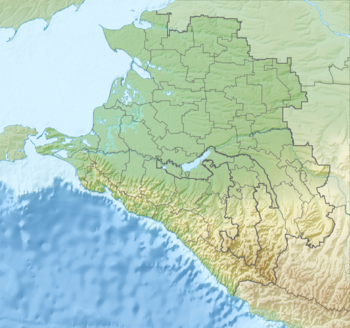Abzakhs
This article needs additional citations for verification. (April 2024) |
Circassian: Абдзэх | |
|---|---|
| Regions with significant populations | |
| 500,000-1,500,000 | |
| 1,123 | |
| Languages | |
| Adyghe (Abzakh dialect) | |
| Religion | |
| Sunni Islam | |
| Related ethnic groups | |
| Other Circassian tribes | |
| Part of a series on the |
| Circassians Адыгэхэр |
|---|
 List of notable Circassians Circassian genocide |
| Circassian diaspora |
| Circassian tribes |
|
Surviving Destroyed or barely existing |
| Religion |
|
Religion in Circassia |
| Languages and dialects |
|
| History |
|
Show |
| Culture |
The Abzakh (Circassian: Абдзэх, Abdzekh; Russian: абадзехи; also known as Abdzakhs or Abadzekhs) are one of the twelve major Circassian tribes, representing one of the twelve stars on the green-and-gold Circassian flag.[1] Historically, they lived in the mountainous part of the modern Russian republics of Adygea and Krasnodar Krai. Major settlements or villages were located in the river valleys Kurdzhips, Psheha, Pshish, and Psekups.
However, today the vast majority of them live in diaspora in Turkey — about 500,000 people, which are the descendants of those expelled from their homeland as a result of the Russian–Circassian War. After Kabardians, the Abzakh are the second-largest Adyghe tribe in Turkey, other diaspora countries, and in the world in general. They are also the second-largest Adyghe tribe in Israel (after Shapsugs), largest in Jordan, and the sixth-largest in Russia. The Abzakhs are not to be confused with the Abkhazians or the Abaza, yet the naming "abadz'ekh" in Circassian language means "the people who live under the Abazas", but they are different in language.
History
[edit]Before the Caucasian War, Abzakhs inhabited the northern slope of the Caucasus mountain range, near the land of the Shapsug tribe. They were grouped into highland and lowland Abzakhs and favored close relations with the Ubykhs, whom they practically regarded as their own kin.[2]
In 1834, together with the Shapsugs and the Nathukajs, they swore an oath to fight against the Russians.[2] The Abzakhs were reluctant to join non-Circassian commanders, which is why Muhammad Amin failed to win over the Abzakh, most of whom backed Seferbiy Zaneqo.
After the Caucasian war, most Abzakhs (and other tribes) were deported to the Ottoman Empire, the remaining Abzakhs were relocated to the present-day steppe Shovgenovsky District in Adygea.
Culture
[edit]The Abzakh tribe was traditionally divided into nine companies, managed by elected elders. In discussing and resolving important issues elders agreed in a general meeting. Among Circassians, Abzakhs were considered the most warlike.[2]
The Abzakh tribe engaged in arable farming and horticulture, and kept many animals, especially prized horses. In the mountains, the Abzakh mined copper, iron, lead, and silver.
Since the early 19th century, their dominant religion is Sunni Islam.
Language
[edit]The Abzakh people speak a sub-dialect (Adyghe: Абдзахэбзэ) of the West Adyghe dialect of the Circassian language.[3]
Israel
[edit]About 1,123 Abzakh people live in the Rehaniya, in Galilee (Northern District, Israel), where there is an Adyghe museum.
In 1958, Abzakhs (and other Adyghe tribes) of Israel were allowed to enter military service, which gave them a number of privileges. In Israel, the Abzakh are the second largest Adyghe tribe, after the Shapsug.
Notable people
[edit]- Hulusi Salih Pasha (1885–1939); Ottoman Grand Vizier (1920), admiral, the first Minister of Navy of the Republic of Turkey
- Khirtsizhiqo Ale (?-1836); Military commander
- Wumar Bersey (1807-?); Writer, poem, fabulist, translator and teacher.
- Hasan Bish; Abdzakh Representative of Circassian Majlis[4]
- Hatirbay Tsey; Delegate of the Circassian Parliament during negotiations with Tsar Alexander II in 1861 and a military chieftain[5][6]
- Aslanbech Hajemuqo Pshimaf; Delegate of the Circassian Parliament and a noble[5][6]
- Ibrahim Salehovich Tsey (1890-1936); One of the founders of Adyghe literature and a writer
- Jawdat Said (1931-2022); Islamic scholar
See also
[edit]References
[edit]- ^ "Circassians". Adiga-home.net. 2010. Archived from the original on August 20, 2014. Retrieved 17 May 2016.
The 12 Circassian tribes: Abadzeh Besleney Bzhedug Yegeruqay Zhaney Kabarday Mamheg Natuhay Temirgoy Ubyh Shapsug Hatukay. The twelve stars on the Adyghe flag also refer to the twelve tribes.
- ^ a b c Mitteilungen aus Justus Perthes' geographischer Anstalt "uber wichtige neue Erforschungen auf dem Gesammtgebiete der Geographie (in German). H. Haack. 1860.
- ^ Abzakh sub-dialect Archived 2015-05-18 at the Wayback Machine (in French)
- ^ Наурзова И. Материалы по фольклору, этнографии и истории адыгов. Биографии знаменитых черкесов // Мардж. Париж. 1929. №44.
- ^ a b Natho, Kadir I. (2009-12-03). Circassian History. Xlibris Corporation. p. 362. ISBN 978-1-4653-1699-8.
- ^ a b "çar ıı. aleksandr'ın abzehlerle görüşmesi". studylibtr.com. Retrieved 2024-10-20.

